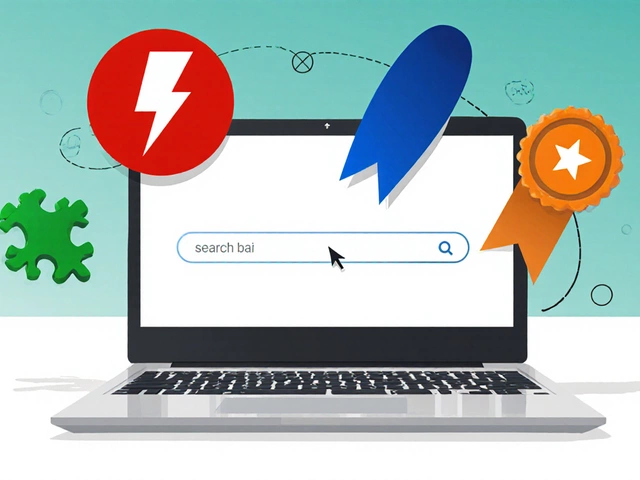In today’s digital landscape, blogging plays an essential role in personal and professional expression, offering a voice to millions. Whether you’re looking to share your passion, build a business, or expand your network, having the right platform is crucial.
Deciding which blogging platform suits your needs can be overwhelming, given the plethora of options. In this article, we delve into some of the leading blogging platforms as of 2024, examining the features and functionalities that make them stand out. From the robust and versatile WordPress to the simplicity of Blogger, we’ll guide you through what each platform offers.
Choosing the right platform not only influences your blogging experience but can also affect your readership and engagement. Join us as we journey through these digital landscapes to help pave your path in the world of blogging.
- The Rise of Blogging Platforms
- WordPress: A Powerhouse of Features
- Blogger: Simplicity and Accessibility
- Emerging Contenders: Wix and Squarespace
- Tips for Choosing the Right Platform
The Rise of Blogging Platforms
In an era where digital expression is at its peak, blogging platforms have become an integral part of how we consume and create content. The evolution from simple online diaries to sophisticated content management systems is fascinating. Back in the early 2000s, platforms like LiveJournal and Blogger were forerunners, offering users a space to share their thoughts in a public forum. Today, the blogging landscape is populated with an array of platforms that cater to diverse needs, whether you're a casual blogger, an influencer, or a business professional looking for reach and engagement.
A major turning point for blogging came with the emergence of WordPress in the mid-2000s. Originally designed as a tool for creating simple blogs, WordPress quickly evolved into a powerhouse, amassing roughly 40% of all websites on the internet by 2024. Its open-source nature and flexibility allowed it to build a vast community of developers and users who could customize it endlessly. This community-driven approach has not only contributed to its longevity but also its innovation. As it stands, WordPress powers a significant percentage of the internet, demonstrating the platform's adaptability and popularity.
With the advent of other platforms like Wix and Squarespace, offering drag-and-drop simplicity and sleek, professional designs, the competition has only intensified. These newer platforms cater to users who might find traditional content management systems too cumbersome. They emphasize ease of use without compromising on aesthetics and have carved a niche in the blogging ecosystem. According to a recent survey, Wix saw a 25% increase in users over the last two years, indicating a shift towards more user-friendly solutions.
The internet's democratization of publishing has forever altered how we communicate, enabling anyone with a story to reach a global audience. - Anil Dash, blogger and entrepreneur
However, blogs are not just about personal expression anymore. In recent years, brands have harnessed the power of blogging to elevate their digital marketing strategies. Content-rich websites help build trust, foster engagement, and improve SEO rankings. Blogs offer an avenue to drive traffic and bolster online visibility. For this reason, choosing the right platform, such as Blogger or WordPress, can be as much a business decision as a creative one.
The rise of mobile-first experiences has also shaped the direction of blogging platforms. As more users access content on the go, responsive design and mobile optimization have become non-negotiable features. Platforms that lacked these features have struggled to keep up or have had to pivot strategies. Knowing when and how the landscape adjusts is key for users who want to remain relevant and engaged in their fields.
In understanding the rise of blogging platforms, it's clear that the digital landscape is as dynamic as the authors who inhabit it. With technological advancements and user expectations continually evolving, platforms must adapt and innovate. No matter what changes come about, the core purpose of a blogging platform remains the same: to offer a means for sharing ideas, stories, and insights with the world. It's an exciting time for content creators, as new opportunities and tools frequently emerge to enhance how stories are told.
WordPress: A Powerhouse of Features
When it comes to content management systems, few names evoke the kind of recognition and trust as WordPress does. Born in 2003, this platform has positioned itself as a leader in the blogging world through its flexibility and the vast array of features it offers to its users. An estimated 43% of all websites on the Internet are powered by WordPress, a testament to its immense popularity and pervasive usefulness in digital spaces. From novice bloggers to major publication houses, WordPress caters to an incredibly diverse audience, making it an integral part of the online ecosystem.
One of the hallmarks of WordPress is its open-source nature, which attracts a global community of developers continuously working to enhance its capabilities. This leads to a prolific assortment of plugins and themes, exceeding 58,000, that allow users to customize their webpages to reflect their personal or brand aesthetics. This extensibility is one reason why so many flock to the platform; it's not just about blogging but creating a complete, dynamic website with built-in SEO tools, effective marketing capabilities, and seamless social media integration. As the platform evolves, it implements modern web technologies, keeping it efficient and relevant in a landscape that changes rapidly.
Among the key reasons for its widespread adoption is the sturdy architecture behind WordPress. It’s built on PHP and MySQL, which makes it particularly suited for developers who want control over every aspect of their website. Yet, its robust backend is matched with an intuitive and user-friendly interface that doesn’t deter beginners. Even those unfamiliar with coding find they can create visually appealing and highly functional sites through its sophisticated editor, Gutenberg. This block-based editor highlights another valuable aspect of WordPress: its commitment to maintaining pace with changing content creation needs, focusing on rich, multimedia-rich storytelling that engages users.
The Community and Ecosystem
The strength of WordPress is not only in its infrastructure but also in the vibrant community that supports it. This community-driven model results in extensive troubleshooting advice, responsive forums, and abundant documentation, making problem-solving more accessible. The platform hosts WordCamps worldwide—informal events designed to bring together WordPress lovers to share ideas, collaborate, and network. These gatherings underscore a philosophy that has set WordPress apart: it's not merely a platform, but a movement promoting open-source collaboration and sharing among individuals with diverse skill sets but common goals.
Security is another core aspect that WordPress prioritizes, with regular updates and a security team dedicated to mitigating vulnerabilities. With cyber threats becoming more sophisticated, having a platform that takes preventive measures against unauthorized access and attacks is crucial. WordPress provides options to set robust security practices, including two-factor authentication and regular malware scans, ensuring that user data and content remain protected.
"WordPress is a content management powerhouse and anyone not using it is missing out on a platform that can evolve with your needs," states Matt Mullenweg, co-founder of WordPress.
For businesses and individuals looking to improve visibility, WordPress offers built-in SEO capabilities, making it a top pick from an SEO perspective. It supports SEO-friendly URL structures, metadata, and built-in sitemaps, while plugins like Yoast SEO ensure even the smallest details are optimized for search engines. Considering the growing importance of search rankings, WordPress stands out as an invaluable tool in the quest for a strong online footprint, proving essential for those pursuing digital marketing strategies.
In conclusion, WordPress thrives on providing a comprehensive blogging and website creation experience that is difficult for competitors to replicate. Whether it's the scaling capabilities, dynamic options for personalization, strong community backing, or its dedication to security and SEO, the platform remains a top choice for many. As the digital domain progresses, WordPress shows no signs of losing its relevance, continuing to adapt and anticipate the intricate needs of its users.

Blogger: Simplicity and Accessibility
Blogger remains one of the most accessible platforms for writers, celebrated for its straightforward approach to publishing online content. Established by Pyra Labs in 1999 and later acquired by Google in 2003, Blogger allows users to focus primarily on the message rather than the mechanics of website management. It’s particularly enticing for beginners due to its intuitive interface and integration with Google services. Users can connect directly to their Google accounts, eliminating the need for additional sign-ups and offering a centralized ecosystem of tools.
The ease of using Blogger cannot be overstated. For people dipping their toes into the ocean of online expression, its minimalistic design methodology is a significant draw. Its simplicity is matched by its affordability—Blogger is entirely free with no hidden costs, making it an attractive option for hobbyists and those looking to test the waters before committing to paid platforms. Additionally, Blogger hosts content without charging for storage or bandwidth, an enormous advantage for those just starting.
"Blogger provides a clean, fast, and reliable service, ideal for those new to blogging—perfect for unleashing creativity without the hassle of technical management," Google spokesperson noted.
Though often underestimated, Blogger offers enough customizability to satisfy many users. It provides various templates which can be adapted with HTML and CSS for those who want a personalized touch without overwhelming complexity. While it's true that Blogger may not offer the depth of features seen in platforms like WordPress, it strikes an appealing balance between functionality and ease of use. Moreover, integration with Google Analytics allows bloggers to monitor their audience and refine their engagement strategies effectively.
Many users appreciate how quickly they can publish—with just a few clicks, content gets uploaded, and periodically, this simplicity may supersede the more sophisticated tools offered by other platforms. Blogger supports various media types, making it possible to enhance posts with images and videos seamlessly. For the estimated one million monthly active users, this platform remains beloved for being straightforward yet effective, a digital sanctuary for those who wish to put words above all else.
There remains a question about the future direction Blogger might take; however, this uncertainty does not deter the platform's faithful audience. For creators who prioritize simplicity, straightforward usability, and zero costs, Blogger continues to be a wise choice, steady like a timeless vessel navigating through the ever-evolving waters of the internet.
Emerging Contenders: Wix and Squarespace
Wix and Squarespace have quickly risen to prominence in the world of blogging platforms, distinguished by their user-friendly interfaces and expansive customization options. These platforms cater not only to bloggers but also to small business owners, artists, and freelancers eager to showcase their portfolios. Unlike the traditional WordPress, what sets Wix apart is its drag-and-drop functionality, allowing users with even the barest technical skills to craft stunning websites. Squarespace, renowned for its sleek, designer-grade templates, offers a more structured editing experience but does not sacrifice flexibility, making it a favorite among those with an eye for aesthetics.
Both platforms have invested heavily in improving their feature sets to compete with giants in the blogging industry. Wix, for example, offers an App Market that integrates seamlessly with its websites, providing users with additional tools such as SEO tracking, email marketing, and event scheduling. This enables a one-stop solution for those looking to expand their online presence without the hassle of managing multiple services. Meanwhile, Squarespace takes pride in its sophisticated e-commerce capabilities, allowing businesses to sell products directly from their sites. Their platform's comprehensive analytics tools deliver insights on visitor behavior, empowering users to craft strategies tailored to their audience's preferences.
The choices between these two often boil down to individual preferences, and the specific kind of creative expression one aims for. Although they share common goals, the roads they pave are slightly different. Wix's approach, teeming with creative freedom, is best for those who enjoy spontaneous design explorations. Squarespace, however, resonates with users who appreciate carefully curated aesthetics and typeface craftsmanship. According to a recent survey conducted by WebsiteToolTester, Wix and Squarespace have succeeded in increasing their user bases by approximately 10% in the past year alone. This statistic underscores their growing acceptance among digital creators and entrepreneurs.
"Squarespace offers elegance in simplicity, and its dedicated team continuously improves the platform, ensuring it remains both modern and highly functional," says Jon Cerise, a prominent digital artist and blogger. This quote speaks volumes about why Squarespace may be the choice for individuals who prioritize beauty alongside functionality.
Undoubtedly, both Wix and Squarespace have found their unique niches in the digital world. They're not just alternatives; for the right user, they are the preferred choice. Their commitment to improving user experience without confusing the user with overly technical jargon makes them both standout contenders in an increasingly crowded market. Bloggers aiming to either establish their brand or cultivate a specific artistic tone will find value in exploring these platforms. Whether your journey takes you through the vibrant avenues of Wix or the refined pathways of Squarespace, the tools and support you receive are designed to elevate your digital presence.

Tips for Choosing the Right Platform
Venturing into the world of blogging is often like setting sail on an uncharted sea. The choice of a blogging platform will ultimately shape your journey, serving as the vessel that carries your voice to the digital shores of your audience. So how do you choose the right one among the many? The secret, as with many great adventures, lies in preparation and understanding your unique needs and goals. First, consider the extent of customization you require. For those looking to build something with significant personal flair, WordPress may just be the artisan’s choice, offering an expansive library of plugins and themes. Its open-source nature gives room for creative expansion not parallelled by other platforms. In contrast, if simplicity and speed are of the essence, platforms like Blogger can provide a more streamlined set-up with fewer bells and whistles to navigate.
A crucial aspect to weigh is your level of technical expertise. While platforms like WordPress cater to those who are comfortable rolling up their sleeves and getting into the technical nitty-gritty, others, including Wix and Squarespace, offer an intuitive drag-and-drop interface. For the tech-averse, these might encompass an easier entry into the blogging sphere, enabling a focus on content without the distraction of backend complexities. Do take stock of your willingness to invest in learning the ropes, as mastering a platform could enhance your blog’s functionality substantially over time.
Then there’s the question of purpose. Are you blogging for personal expression, or is there commercial intent behind your creations? E-commerce integration might be a deciding factor if your aim is to sell products or monetize your content. Platforms like Shopify effortlessly integrate these features, while WordPress with WooCommerce support can turn your blog into a virtual storefront if you fancy delving into plugin magic. Blogger, although fantastic for writers, might not support intricate e-commerce needs without significant limitations.
Don’t overlook the importance of community and support. Platforms that boast vast communities often give rise to a wealth of user-generated content, tips, and solutions to the problems you might face. WordPress, with its extensive support forums and tutorials, often proves to be an invaluable resource. Similarly, platforms like Medium connect you with like-minded enthusiasts, fostering an engaging community that inspires and supports.
For those in need of numbers, consider digging into statistics and reviews. According to a recent survey, approximately 41% of all websites globally are powered by WordPress, highlighting its popularity and trustworthiness among users. Other platforms like Blogger hold a niche appeal, with remarkable ease of use standing as key selling points. Understanding these trends not only helps in making an informed decision but also prepares you for the competitive landscape you’re entering.
John Doe, an acclaimed tech journalist, once wrote, "Choosing a blogging platform is akin to picking the perfect pot for your plant—it defines the boundaries within which your creativity will flourish."
Finally, think ahead. As your blog grows, so too will your needs. Ensure your chosen platform can scale alongside your ambitions without incurring prohibitive costs or complex migrations. Asking yourself where you want your blog to be in a year—or five—is an essential component of this decision-making process. With careful consideration and a bit of foresight, you'll find a platform that's more than just a tool but a partner in your blogging success.



